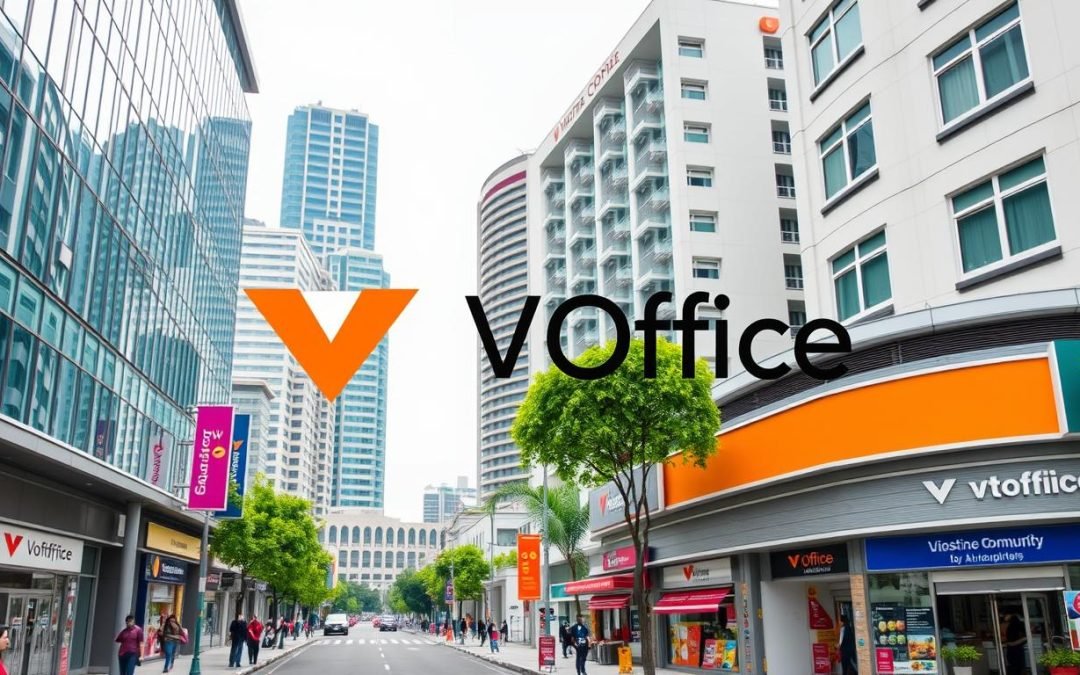In Singapore, the government helps small businesses grow with many initiatives. It’s key for entrepreneurs to know about this support. The country offers resources like funding for startups and programs for different needs. These help businesses grow and succeed.
The government gives grants and financial aid to support small businesses. It works with agencies like the Ministry of Trade and Industry (MTI) and Enterprise Singapore. Their goal is to help entrepreneurs with guidance and funds. This support aims to boost innovation, increase productivity, and make our economy stronger.
Introduction to Government Support for Small Businesses in Singapore
The government of Singapore offers a lot of help to small businesses. This support is key for starting new businesses and keeping the economy strong. They use grants, subsidies, and training to help businesses grow and compete better.
The Productivity Solutions Grant (PSG) gives up to 50% financial help to businesses that use new productivity tools. This is a big help for small businesses in Singapore, letting them use important digital tools without spending a lot. The T-Up program also helps by giving access to research and development talent to improve businesses from within.
The Corporate Income Tax (CIT) Rebate gives a 50% rebate on corporate tax to all companies that pay taxes. This rebate is especially good for small companies that hire local workers. The Energy Efficiency Fund (E2F) also helps by funding projects that save energy for manufacturing SMEs, making the industry more sustainable.
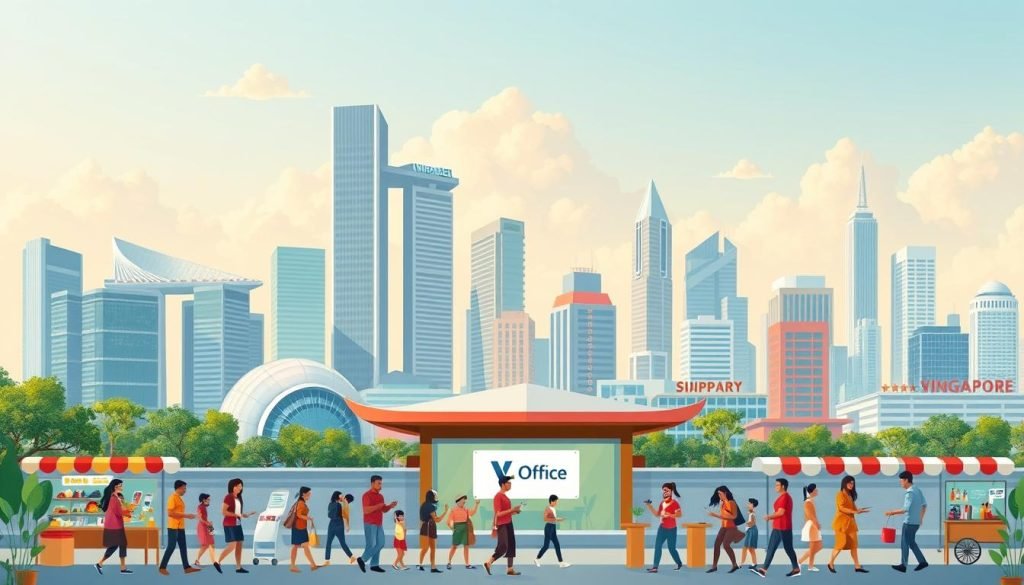
There are also funds like the Maritime Innovation and Technology Fund (MINT) for certain industries. This shows how committed the government is to helping small businesses in Singapore. They aim to create a strong and supportive environment for entrepreneurs.
Overview of Funding Options Available for Startups
Startups in Singapore have many funding options for startups Singapore to start their businesses. The government offers grants, loans, and tax incentives to help new companies grow. These programs support businesses at different stages of growth.
Types of Funding Programs
There are several programs for startups, including:
- Startup SG Founder: Offers up to S$30,000 by matching S$3 for every $1 raised.
- Startup SG Tech: Provides funding of up to S$250,000 for Proof-of-Concept projects and up to S$500,000 for Proof-of-Viability projects.
- Enterprise Development Grant (EDG): Subsidizes 30%-70% of project costs for Small Medium Enterprises (SMEs).
- Productivity Solutions Grant (PSG): Covers up to 70% of project costs to enhance automation and R&D.
- VentureForGood (VFG) Grant: Supports social enterprises with funding up to $300,000.
These programs aim to boost innovation and sustainability in startups. They also encourage entrepreneurship in Singapore. Learn more about the funding types and their benefits.
Eligibility Criteria for Financial Support
To get financial help for small businesses in Singapore, startups must meet certain requirements. For the Startup SG Tech program, businesses need to be:
- Less than five years old
- Possessing at least 30% local shareholding
- Generating annual revenue less than S$100 million or employing fewer than 200 people
Startup SG Founder has its own rules. First-time entrepreneurs must own at least 30% of their new company. They must also focus on the business full-time and not have any government funding before. Meeting these rules is key to getting support from various funding programs.
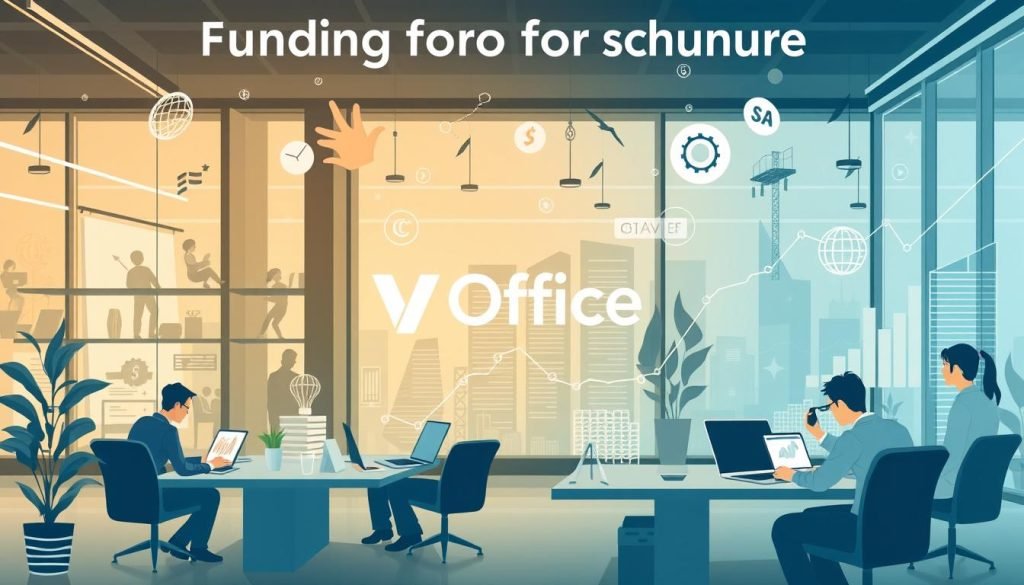
Singapore SME Grants and Their Impact
Singapore’s SMEs are key to its economy, making up 99% of all businesses and employing 70% of the workforce. They add a lot to the GDP, so supporting them is crucial for their growth. The government offers grants to help with innovation, upgrading skills, and reaching new markets.
Benefits of SME Grants
SME grants bring big benefits to businesses. The main advantages are:
- Financial Support: Grants help cover the cost of new technologies and solutions.
- Risk Mitigation: Companies can try new projects with less financial risk.
- Skill Development: Money for training improves skills, making workers more productive.
Popular SME Grant Programs
There are several grant programs for SMEs in Singapore:
| Grant Program | Funding Support | Purpose |
|---|---|---|
| Productivity Solutions Grant (PSG) | Up to 80% | Adoption of digital solutions |
| Enterprise Development Grant (EDG) | Up to 70% | Capability upgrading and innovation |
| Market Readiness Assistance (MRA) | Up to 70% (capped at S$100,000) | Support for overseas expansion |
| Startup SG Founder | Up to S$30,000 | Support for first-time entrepreneurs |
| Digital Resilience Bonus (DRB) | Up to S$10,000 | Encouragement for digital adoption |
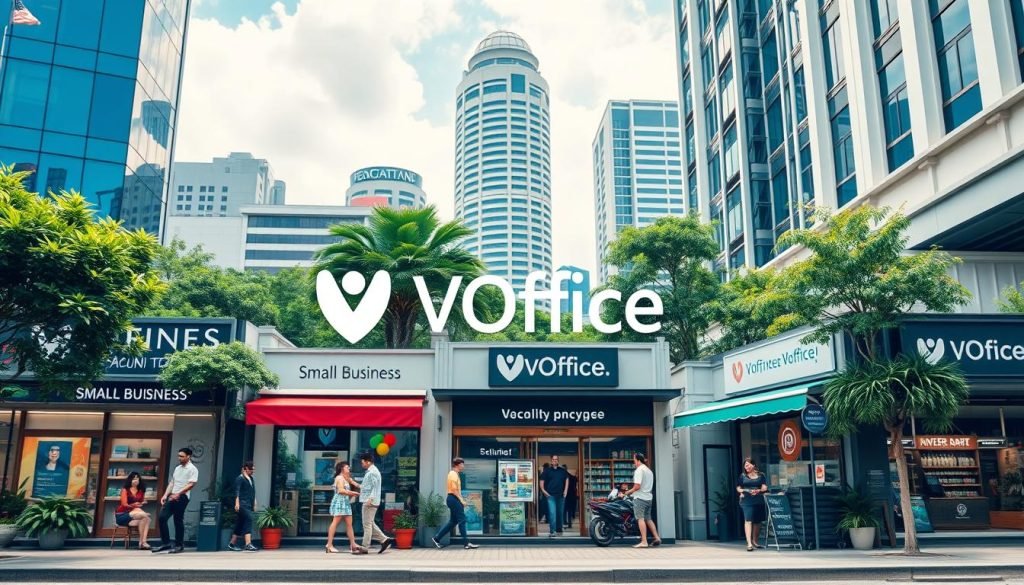
These grants empower small businesses and boost the economy. They help them adapt and grow in a changing market. With ongoing support, SMEs have great opportunities for growth and innovation.
Government Support for Small Businesses in Singapore
In Singapore, the government has many initiatives to help small businesses grow and stay strong. These efforts offer financial help and resources. They let businesses innovate, grow, and overcome challenges. The goal is to make businesses more competitive, encourage entrepreneurship, and help them trade globally.
Key Government Initiatives and Programs
There are many support programs for SMEs in Singapore to ease their financial burdens. Some key initiatives are:
- Temporary Measures: The COVID-19 (Temporary Measures) Act 2020 gave SMEs temporary relief. It helped them manage specific loan types from 20 April to 19 October 2020.
- Loan Deferment Schemes: SMEs had different deferment options based on their sector. For example, Tier 1 and 2 sectors could defer 100% of loan repayments until 31 December 2020. They could extend this until 30 September 2021.
- Enhanced Enterprise Financing Scheme: This scheme offered lower interest rates on working capital loans and bridging loans. It helped SMEs get the funding they needed during recovery.
- Micro-Loan Program: This program gave loans up to S$100,000 to eligible companies for operational costs at good interest rates.
- Market Readiness Assistance Grant: This grant covered up to 70% of costs to set up markets overseas. It was capped at S$20,000 a year.
How to Access These Programs
To get government support for small businesses in Singapore, follow these steps:
- Research and Select Programs: Find the programs that fit your business goals and needs.
- Prepare Documentation: Gather the needed documents, like financial statements and project proposals, for each program.
- Submit Applications: Apply to the right agencies, such as Enterprise Singapore for financing, by the deadlines.
- Follow Up: Talk to program reps to check on your application and answer any questions.
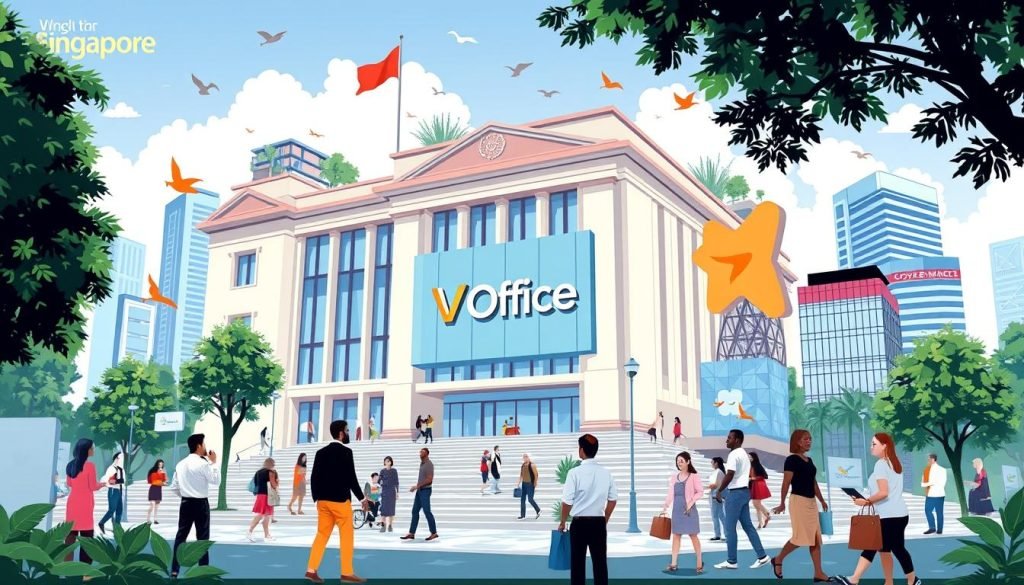
Financial Aid for Small Businesses in Singapore
Getting financial aid is key for small businesses in Singapore to grow and stay strong. There are grants, interest-free loans, and wage help available. These aids help businesses do well and boost Singapore’s economy.
Types of Financial Aid Available
Small and Medium Enterprises (SMEs) have access to many financial programs. These programs help with different needs:
- Enterprise Development Grant (EDG): Covers up to 50% of costs, with 90% funding during the pandemic.
- Productivity Solutions Grant (PSG): Helps with up to 50% of costs for going digital, up to 80% for a short time.
- Market Readiness Assistance (MRA) Grant: Gives up to 50% funding for entering new markets, with a S$100,000 limit.
- Enhanced Sustainability Package (ESP): Supports up to 70% of costs until 2026 for businesses with at least 30% local ownership.
- Career Conversion Programme (CCP): Helps hire and keep skilled workers in SMEs.
- Various Tax Reliefs: IRAS offers big tax breaks, helping new startups with cash flow.
Application Process for Financial Aid
Getting financial aid for small businesses in Singapore means following a clear process. Businesses need to:
- Find the right grants or programs for their needs.
- Gather needed documents like financial statements and business plans.
- Apply through the Business Grants Portal for easy access to support.
- Keep an eye on the application and meet any extra agency requests.
Knowing these steps helps businesses make the most of the aid available.

Business Development Grants in Singapore
Business development grants are key to boosting Singapore’s entrepreneurial scene. They help with tech upgrades, market growth, and new ideas. These grants support a wide range of businesses, helping them succeed in a tough market.
What Are Business Development Grants?
These grants are financial aids given by the government to help local businesses, especially SMEs. They cover costs like tech adoption and consultancy fees. This lets businesses innovate and boost their productivity. For example, the Productivity Solutions Grant (PSG) gives up to 50% funding for costs linked to improving productivity.
How to Qualify for These Grants
To get business development grants in Singapore, you must meet certain requirements. You need to be a Singapore-registered company with a local shareholding. For the PSG, your company’s annual sales must be under S$100 million, and you must aim to boost productivity. Other grants might ask for a certain number of local staff or projects that match national economic goals.
| Grant Name | Funding Amount | Eligibility Criteria |
|---|---|---|
| Productivity Solutions Grant (PSG) | Up to $30,000 | Local shareholding of 30%, sales turnover |
| LEAD Connect Grant | $30,000 | Applicable to large enterprises only |
| LEAD Transact Grant | Up to $40,000 | Large enterprises with necessary business partner transactions |
| E2F Program | Up to 70% co-funding | For energy efficiency projects |
| Technology for Enterprise Capability Upgrading (T-Up) | Varies | Access to talents from A*STAR’s Research Institutes |
Understanding the Productivity Solutions Grant (PSG)
The Productivity Solutions Grant (PSG) was launched in April 2018. It helps businesses improve their productivity with digital tools and technologies. The grant covers up to 50% of qualifying costs, with a cap of S$30,000 per company. This supports entrepreneurs in Singapore by making innovative solutions more accessible, helping businesses grow and work more efficiently.
What Does the PSG Cover?
PSG funding supports various areas of digital transformation for businesses. It includes IT systems, consultancy services, and equipment that boost productivity. The grant also focuses on solutions for specific sectors and general use, helping different industries like logistics, retail, and e-commerce. Here’s a quick look at what the PSG covers:
| Category | Description | Example Solutions |
|---|---|---|
| IT Solutions | Pre-approved software and systems that enhance business functions | Customer relationship management (CRM) tools |
| Equipment | Tools that aid in operational efficiency | Point-of-sale (POS) systems |
| Consultancy Services | Expert advice to improve business operations | Digital marketing strategy development |
Steps to Apply for PSG Funding
Applying for the Productivity Solutions Grant is easy. First, your business must meet certain requirements. Here’s how to apply:
- Ensure your business is registered and operating in Singapore.
- Make sure your business has at least 30% local ownership.
- Check if your business has fewer than 200 employees.
- Prepare your documents, like financial statements and solution details.
- Apply online through the official portal.
- Wait for a response, usually within six weeks.
Exploring the Enterprise Development Grant (EDG)
The Enterprise Development Grant Singapore offers crucial funding for local businesses looking to grow. It helps with projects that boost innovation, productivity, and market access for SMEs. By knowing the EDG’s key features, businesses can use support programs for SMEs Singapore to expand.
Core Business Capabilities Supported by EDG
The EDG supports three main areas: Core Capabilities, Innovation & Productivity, and Market Access. It includes various initiatives, such as:
- Third-party consultancy services
- Software and equipment costs
- Incremental manpower costs to enhance workforce skills
Eligible projects can get up to 80% funding for approved costs. To apply, businesses need at least 30% local ownership and to show they can financially sustain the project.
Process for EDG Application and Approval
The EDG application process has several steps:
- Pre-application preparation
- Submitting the application
- Evaluation by relevant authorities
- Approval of the grant
- Claiming the grant through the Business Grants Portal (BGP)
Applicants must work with certified consultants to ensure success. The review takes four to six weeks. After approval, successful applicants can get up to 90% back on approved costs.
With careful planning and following the rules, businesses can use the Enterprise Development Grant Singapore for major growth. It’s a vital part of support for SMEs in Singapore.
The Importance of Business Subsidies in Singapore
Business subsidies are key to helping small businesses in Singapore do better. They lower costs and encourage innovation. This lets businesses grow and compete well.
With government support, many small and medium-sized enterprises (SMEs) get the resources they need. This helps them grow and stay strong.
How Subsidies Elevate Small Business Performance
Financial aid for small businesses in Singapore has many benefits. These include:
- Financial Assistance: It lowers the financial stress on businesses. This lets them use their money better.
- Increased Credibility: Government grants make businesses look better to potential investors.
- Scaling Opportunities: Subsidies help companies grow bigger, both at home and abroad.
- Access to Resources: Businesses get help with mentorship, networking, and new technologies.
Examples of Available Subsidies
There are many subsidies for different sectors in Singapore, like:
- Energy Efficiency Fund (E2F): Helps businesses save energy and cut costs.
- Maritime Innovation and Technology Fund (MINT): Supports maritime companies with new technologies.
- Productivity Solutions Grant (PSG): Covers up to 80% of the cost for productivity solutions.
- Enterprise Development Grant (EDG): Offers up to 70% funding for certain projects.
These programs show how a business subsidy in Singapore can be a big help for SMEs. They meet the unique needs of these businesses and boost the economy.
Emerging Support Programs for SMEs in Singapore
The support programs for SMEs in Singapore are always changing. They bring new government support to help businesses grow. These programs aim to boost business skills in a tough economy with high inflation and strong competition.
Innovative Support Initiatives
Grants are a big part of these programs. They help cover costs for upgrading tech and entering new markets. The Productivity Solutions Grant (PSG) gives up to 80% funding for using productivity solutions. This helps SMEs improve in areas like managing customers and handling finances.
The Enterprise Development Grant (EDG) also supports tech adoption and innovation, offering up to 70% funding. It helps businesses grow and reach new markets. The Market Readiness Assistance (MRA) grant gives up to 70% funding for entering new markets. These grants give SMEs the tools they need to succeed.
Benefits of New Support Programs
These programs help SMEs work better and save money. For example, the Enhanced Training Support Package (ETSP) offers up to 90% funding for courses to improve employee skills. The Global Company Partnership (GCP) grant also helps with growing businesses overseas.
Here’s a table that shows the main points of these programs:
| Program Name | Funding Percentage | Usage |
|---|---|---|
| Productivity Solutions Grant (PSG) | Up to 80% | Productivity solutions adoption |
| Enterprise Development Grant (EDG) | Up to 70% | Technology adoption, innovation projects |
| Market Readiness Assistance (MRA) | Up to 70% | Market entry support |
| Global Company Partnership (GCP) | Up to 70% | Overseas business development |
| Enhanced Training Support Package (ETSP) | Up to 90% | Employee skill development |
Conclusion
Singapore’s government offers strong support for small businesses with many kinds of help. This includes the Small Business Recovery Grant (SBRG) for tough times. It also has the Enterprise Development Grant (EDG) and the Startup SG Founder program for new entrepreneurs.
These programs are key for small businesses wanting to grow and stay strong. The SkillsFuture Enterprise Credit (SFEC) and the Productivity-Max (P-Max) Program focus on improving workers’ skills. They help SMEs meet new market needs with financial and tech support.
The government keeps adding more resources to help the economy, including more support for grants. This makes now a great time for entrepreneurs and small business owners to use these resources. By taking advantage of government support, entrepreneurs can reach their full potential and lead their businesses to success.
FAQ
What types of government support are available for small businesses in Singapore?
How can I access financial assistance for my startup in Singapore?
What are some popular SME grants available in Singapore?
What is the application process for the Productivity Solutions Grant (PSG)?
Are there any tax incentives for small businesses in Singapore?
What types of financial aid can I receive for my small business in Singapore?
How do business development grants support small businesses?
What are the benefits of participating in government support programs for SMEs?
How do I know if my business is eligible for financial aid?
Are there any new support programs available for SMEs in Singapore?
Source Links
- https://www.gobusiness.gov.sg/e-services/gov-assist-biz/
- https://www.devhaus.com.sg/resources/article/types-of-grants-for-local-businesses-in-singapore-in-2024
- https://sleek.com/sg/resources/singapore-government-funding-grants-for-entrepreneurs/
- https://www.gobusiness.gov.sg/gov-assist/grants/
- https://www.atc.sg/singapore-government-business-sme-grants-support-assistance.php
- https://www.startupdecisions.com.sg/singapore/incentives/startup-funding-sources
- https://www.lendingpot.sg/blog/the-top-8-grants-schemes-to-get-funding-for-singapore-startups
- https://www.devhaus.com.sg/resources/article/how-should-a-new-startup-in-singapore-find-funding
- https://www.smbgrant.com/9-useful-sme-grants-singapore-businesses.html
- https://www.volopay.com/sg/blog/sme-grants-in-singapore/
- https://www.incorp.asia/blogs/sme-grants-singapore/
- https://www.mas.gov.sg/covid-19/supporting-businesses-through-covid-19/support-for-smes
- https://www.sg/oursingaporefund/getting-started
- https://www.3ecpa.com.sg/resources/finances-and-grants/singapore-government-grants-financing-schemes-assistance/
- https://www.lanturn.com/sg/blog/small-medium-enterprises-2021-definitive-support-kit-for-smes-in-singapore-grants-incentives-initiatives-and-resources
- https://www.wealthbridgecs.com/sg-guide/singapore-government-business-sme-grants
- https://www.tech.gov.sg/media/technews/3-must-have-tech-tools-for-singapore-businesses/
- https://www.enterprisesg.gov.sg/financial-support/productivity-solutions-grant
- https://www.gobusiness.gov.sg/productivity-solutions-grant/
- https://www.incorp.asia/blogs/psg-grant/
- https://www.oom.com.sg/all-about-productivity-solutions-grant-psg/
- https://www.enterprisesg.gov.sg/resources/all-faqs/enterprise-development-grant
- https://finnex.com.sg/enterprise-development-grant-edg-in-singapore-an-overview/
- https://timcole.com.sg/understanding-the-enterprise-development-grant-edg/
- https://www.netsuite.com.sg/portal/sg/resource/articles/business-strategy/business-grants.shtml
- https://www.aseanbriefing.com/doing-business-guide/singapore/taxation-and-accounting/tax-incentives-for-businesses
- https://aspireapp.com/blog/popular-sme-grants-from-singapore-government
- https://www.smartnation.gov.sg/resources/business/
- https://www.businesstimes.com.sg/singapore/smes/government-schemes-have-something-everyone-help-smes-transform-and-grow
- https://bbcincorp.com/sg/articles/smes-grant-singapore
- https://www.navisteps.com/blog/44-initiatives-for-businesses-in-singapore-2021/

